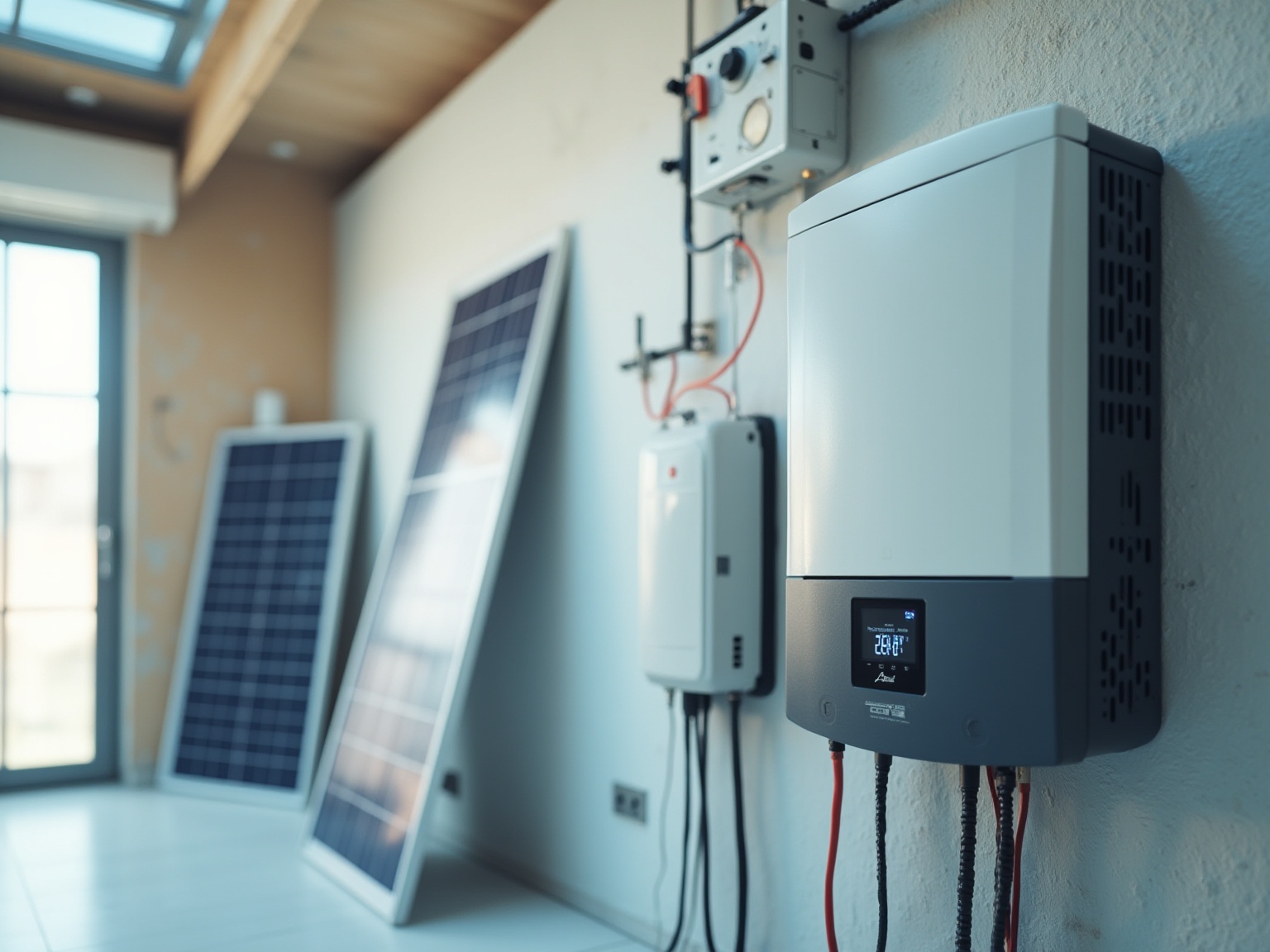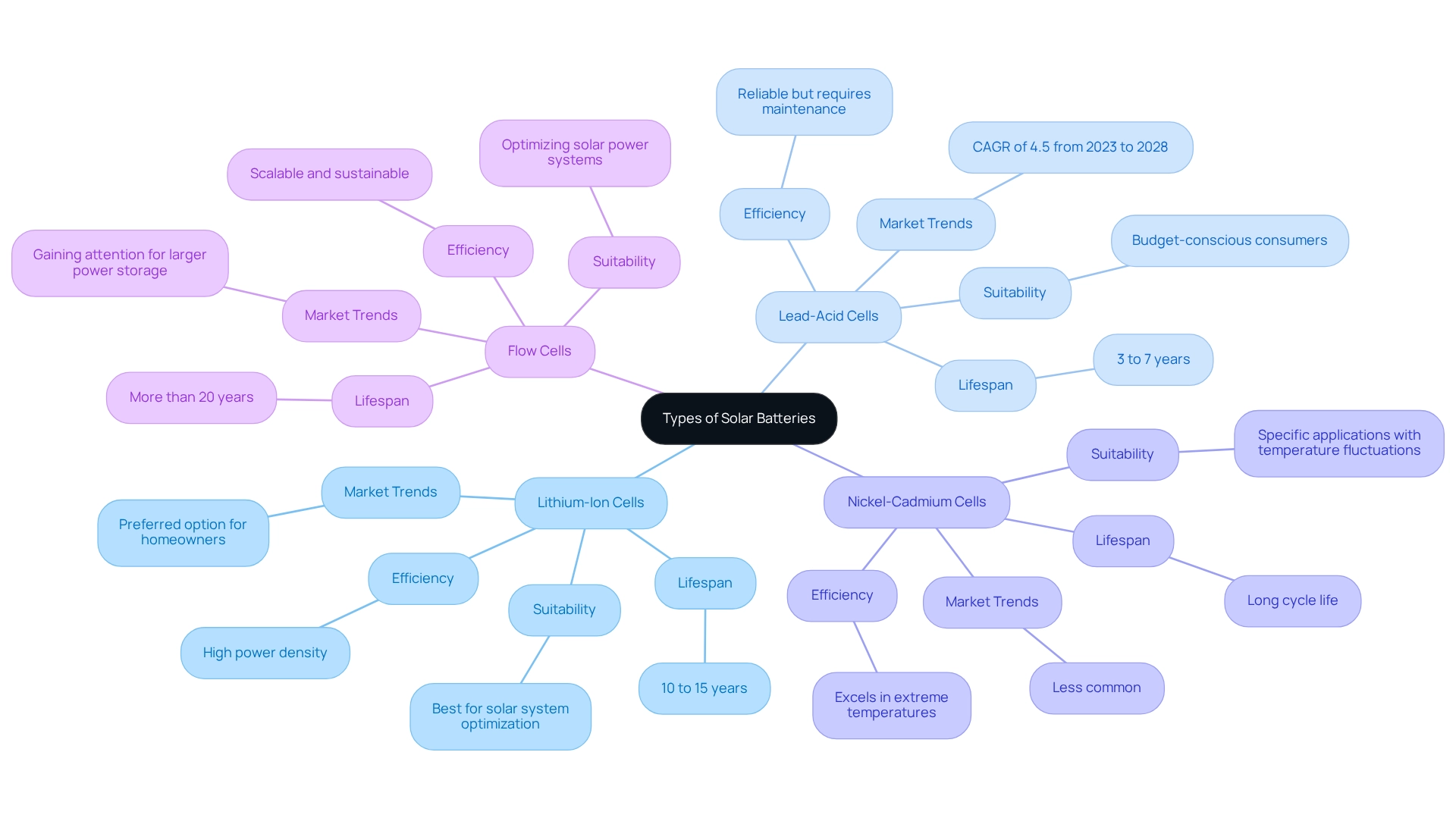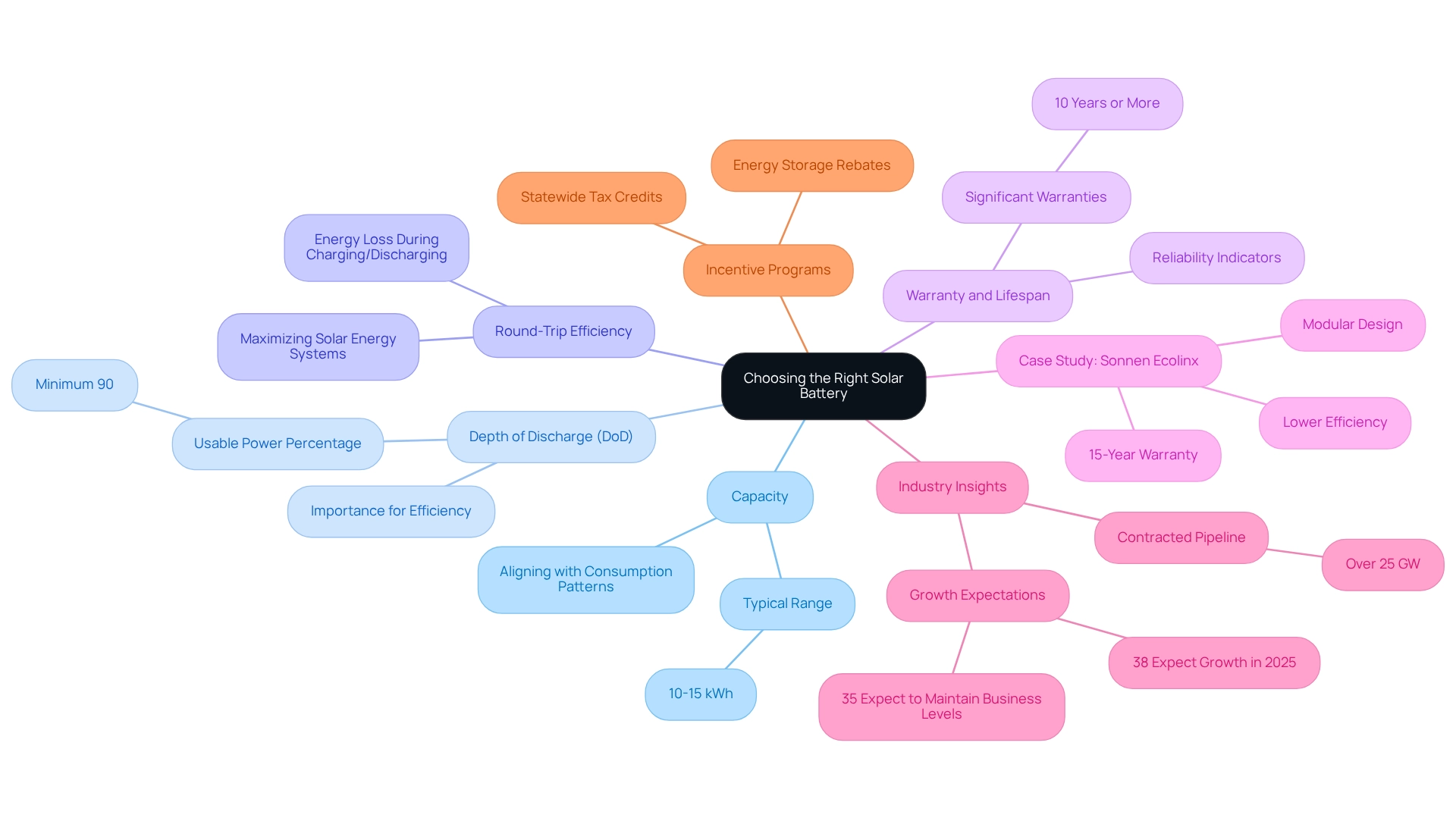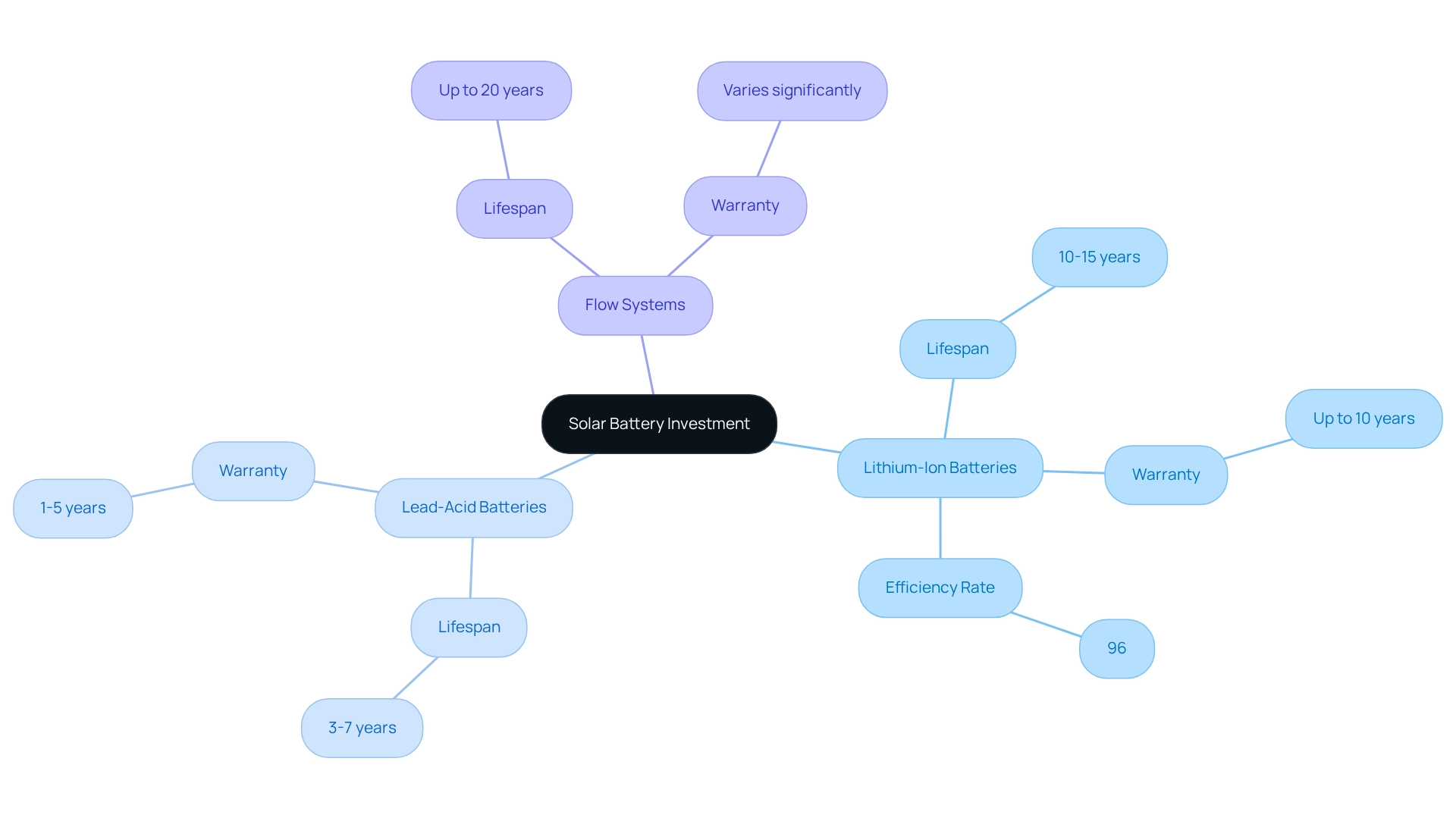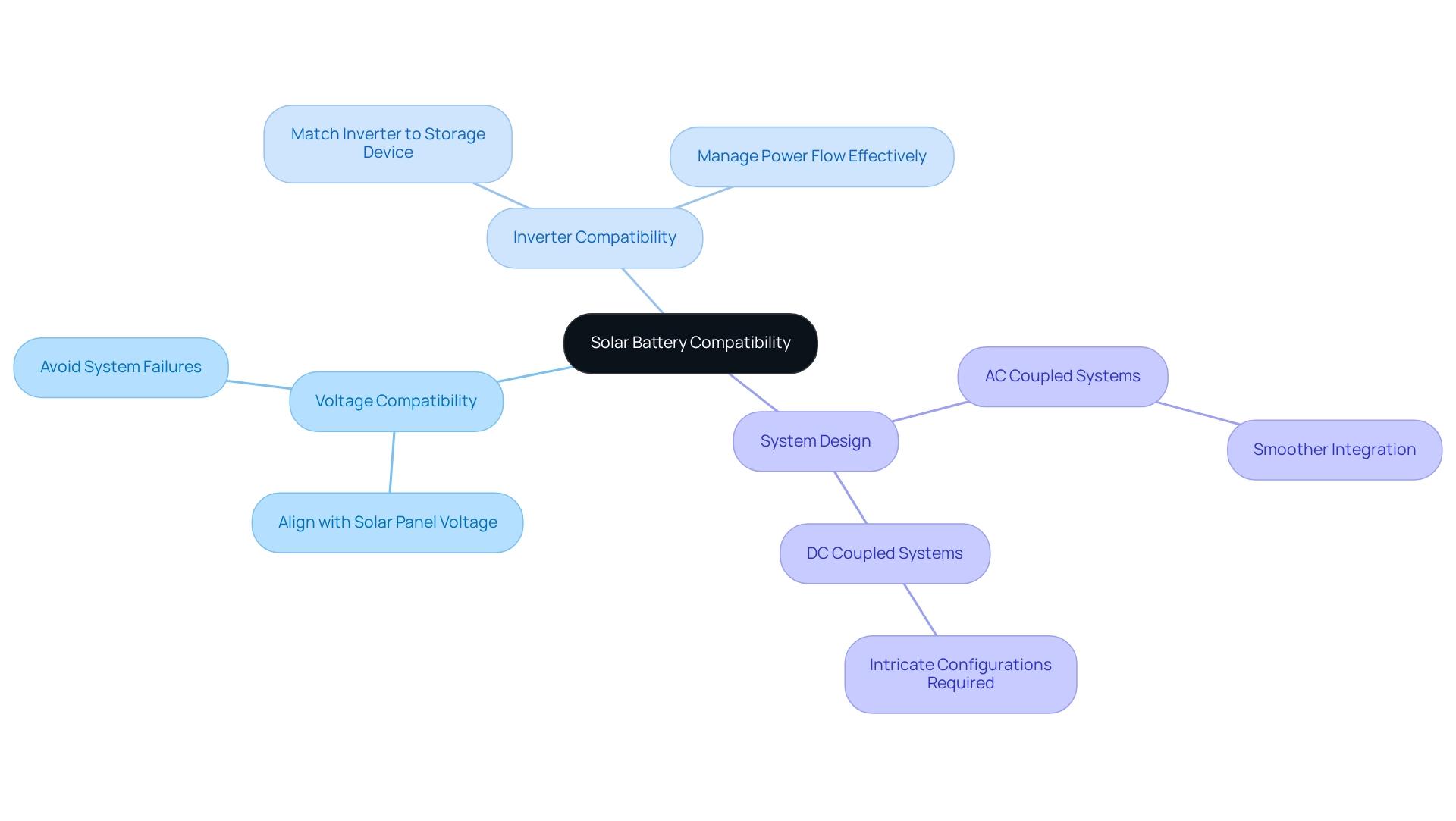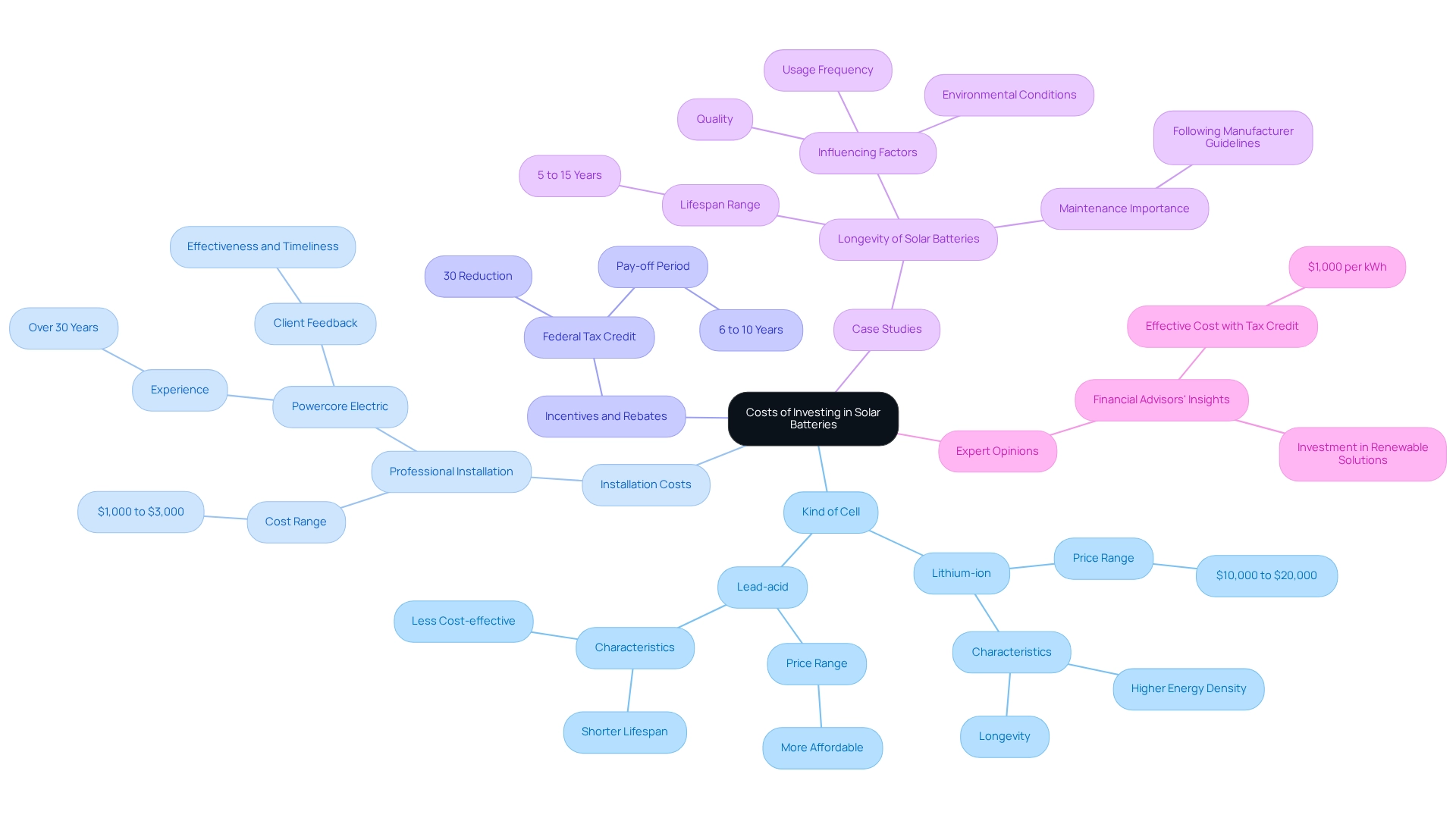Overview
Are you feeling overwhelmed by rising energy bills? It’s a common concern for many homeowners. In 2025, the best batteries for solar systems are primarily lithium-ion and lead-acid types, with lithium-ion batteries being favored for their efficiency, longevity, and lower maintenance needs. Recent advancements in photovoltaic technology highlight how these solutions can help you achieve not just energy security but also peace of mind.
Homeowners are increasingly prioritizing efficiency in their solar energy solutions, and we understand that making the switch can feel daunting. But together, we can explore how solar energy can lead to greater energy independence and lower costs.
Let’s work towards a sustainable future that not only benefits you but also contributes to a healthier planet. If you’re ready to take the next step, we’re here to support you every step of the way.
Introduction
In a world increasingly reliant on renewable energy, many homeowners find themselves concerned about rising energy bills and the unpredictability of power supply. Solar batteries have emerged as a crucial component of solar energy systems, providing a nurturing solution by allowing individuals to store excess electricity generated by solar panels.
These batteries not only enhance energy independence but also offer a reliable power source during low sunlight periods or outages, ultimately reducing reliance on the grid. We understand that energy resilience is a priority for many, and as technology advances, the landscape of solar batteries is evolving.
A growing number of homeowners are recognizing their importance for backup power, fostering a sense of security in uncertain times. This article delves into the various types of solar batteries available, key considerations for choosing the right one, and the latest trends shaping the future of solar energy storage.
Together, we can empower you to make informed decisions about your energy needs, ensuring you feel supported every step of the way.
Understanding Solar Batteries: The Backbone of Solar Energy Systems
Are you feeling overwhelmed by rising energy bills? Photovoltaic storage devices stand out as the best batteries for solar system applications, playing a vital role in renewable power systems by storing surplus electricity generated by solar panels. This stored energy becomes essential during periods of limited sunlight or , ensuring that you and your family have a reliable power supply at all times. By harnessing the power of sunlight effectively, homeowners can significantly reduce their reliance on the grid, leading to lower electricity costs and greater self-sufficiency.
Recent advancements in photovoltaic storage technology have made these batteries more efficient and accessible than ever before. In 2025, a remarkable 80% of homeowners who installed storage systems did so primarily for backup power, reflecting a growing trend toward energy resilience. This is especially pertinent in California, where soaring electricity costs and frequent outages have driven many to seek dependable alternatives.
Indeed, the primary motivation for homeowners installing storage units in 2024 was for backup power, underscoring the increasing demand for energy security.
Numerous successful case studies illustrate the benefits of integrating the best batteries for solar systems into residential power setups. For instance, homeowners who adopted storage solutions reported not only enhanced power security but also a notable decrease in their dependence on traditional energy sources. This is particularly significant given the 4% decline in residential installations in Q3 2024, attributed to high electricity prices and power outages.
Photovoltaic storage units can help address these challenges, paving the way for a more sustainable energy future and providing the best batteries for solar systems to meet the growing demand for renewable energy options. Additionally, the integration of Tesla residential chargers with photovoltaic storage systems can further enhance energy efficiency and convenience for homeowners. These chargers facilitate seamless charging of electric vehicles using sunlight, amplifying the benefits of photovoltaic setups.
Moreover, government initiatives aimed at promoting the adoption of photovoltaic technology offer incentives for homeowners to invest in both solar panels and storage solutions, making these technologies more accessible.
Experts emphasize the critical importance of the best batteries for solar systems in modern energy landscapes. Analysts note that as energy usage patterns evolve, the role of photovoltaic cells will become increasingly vital in balancing power supply and demand. Ben Zientara, a Policy Analyst for renewable energy, highlights that 38% of companies in the sector expect growth in 2025, indicating a positive outlook for the adoption of energy storage solutions.
Recent statistics reveal that a significant number of California residents are now utilizing solar storage systems, further underscoring their importance in the transition to renewable resources.
In conclusion, the best batteries for solar system storage are essential—they are not merely an addition to photovoltaic power systems but are fundamental to optimizing the use of renewable resources, ensuring power reliability, and fostering a sustainable energy future. Powercore Electric’s dedicated team of specialists guarantees high-quality installations and maintenance, positioning them as a trusted partner for homeowners looking to embrace energy storage solutions.
Exploring Different Types of Solar Batteries: Lithium-Ion, Lead-Acid, and More
Understanding the best options for energy storage is crucial for homeowners who are concerned about rising energy bills. The most prevalent varieties of storage systems consist of:
- Lithium-Ion Cells: Famous for their high power density and effectiveness, lithium-ion cells have emerged as the favored option for numerous homeowners. They usually provide a lifespan of 10 to 15 years, making them a long-term investment for power storage. Their efficiency and longevity render them the best batteries for solar system optimization, offering outstanding capacity and environmental advantages.
- Lead-Acid Cells: As a conventional choice, lead-acid cells are recognized for their affordability. While they are dependable, they need regular upkeep and typically have a shorter lifespan of 3 to 7 years in comparison to lithium-ion cells. Their market share remains significant, particularly among budget-conscious consumers. Notably, the global lead-acid cell market is projected to grow at a CAGR of 4.5% from 2023 to 2028, indicating a competitive landscape.
- Nickel-Cadmium Cells: Although less common, nickel-cadmium cells excel in extreme temperature conditions and have a longer cycle life, making them suitable for specific applications where temperature fluctuations are a concern.
- Flow Cells: These cells are gaining attention for their scalability and longevity. They can endure for more than 20 years and are especially beneficial for greater power storage requirements, offering a sustainable choice for individuals seeking to optimize their solar power systems.
We understand that choosing the right battery is a significant decision that impacts your energy independence. Powercore Electric is dedicated to assisting residents in navigating these options, especially as the U.S. increases its energy storage manufacturing capacity. With 14 new projects totaling 65 GWh announced in August 2023, the market is poised for growth, and homeowners can benefit from a wider range of innovative solutions tailored to their specific requirements.
Additionally, recycling of is emerging as a significant secondary source of supply for critical minerals, promoting sustainability in the industry. As Tajammul Pangarkar, CMO at Prudour Pvt Ltd, observes, improvements in storage technology are essential for enhancing power consumption and ensuring efficient resource management. Together, we can work towards a more sustainable future, and we encourage you to reach out for guidance as you explore these empowering energy solutions.
Key Considerations for Choosing the Right Solar Battery
When considering a solar battery, it’s important to reflect on several key factors that can significantly impact your energy independence and savings. We understand that energy bills can weigh heavily on your budget, and selecting the right battery can help alleviate those concerns. Here are some essential aspects to consider, as outlined in Powercore Electric’s user manual:
- Capacity: This represents the total energy the battery can store, typically measured in kilowatt-hours (kWh). Evaluating your power needs is crucial to determine the appropriate capacity that aligns with your consumption patterns. In 2025, homeowners are expected to utilize with capacities ranging from 10 kWh to 15 kWh, reflecting a growing trend toward larger options that can better meet increased power demands.
- Depth of Discharge (DoD): This metric indicates the percentage of the battery’s capacity that can be safely used. A higher DoD allows for greater usable power, making it essential for optimizing efficiency. Many modern power sources offer a DoD of 80% or more, which is vital for effective resource management. Experts suggest that homeowners should prioritize systems with a minimum DoD of 90% to enhance their energy autonomy.
- Round-Trip Efficiency: This measures how effectively the battery can store and recover energy. Higher round-trip efficiency means less energy loss during charging and discharging, which is particularly important for those looking to maximize their solar energy systems.
- Warranty and Lifespan: A robust warranty and longer lifespan are indicators of a battery’s reliability and performance. Look for products that offer significant warranties, often spanning 10 years or more, to ensure a worthwhile return on your investment.
Real-life examples underscore the importance of these factors. For instance, the Sonnen Ecolinx, crafted for participation in virtual power plants, features a modular design and comes with a generous 15-year warranty and 15,000 cycles. However, it’s noted for its lower efficiency compared to other options, which may make it a pricier choice for some homeowners.
This highlights the necessity of evaluating both capacity and efficiency when selecting the best batteries for your solar system. As the renewable energy sector evolves, understanding these key factors will empower you to make informed decisions, enhancing your sustainability and independence.
Significantly, with a combined contracted pipeline exceeding 25 GW from major firms like Amazon, Google, and Meta, the demand for photovoltaic solutions is on the rise. Additionally, according to Ben Zientara, a Renewable Energy Policy Analyst, ‘38% of all companies in the sector anticipate growth in 2025, and another 35% expect to maintain their current business levels,’ suggesting a positive outlook for the industry.
Moreover, don’t overlook the available statewide tax credits and storage rebates, which serve as popular incentive programs to encourage investment in photovoltaic systems. Understanding how solar panels function on your property can further assist in choosing the ideal storage units to enhance your energy systems. Together, we can navigate this journey towards sustainable energy solutions.
Pros and Cons of the Best Solar Batteries: What You Need to Know
When considering solar batteries, we understand that it’s essential to weigh the pros and cons of the most popular options available today. Many homeowners are concerned about rising energy bills and are looking for sustainable solutions that can provide relief and energy independence.
-
- Pros: These batteries are known for their high efficiency and longer lifespan, making them a preferred choice for many homeowners. Additionally, they require minimal maintenance, which adds to their appeal. Recent insights from the Lithium Iron Phosphate Energy Storage Global Market Report 2025 indicate that these systems are increasingly favored for their applications in .
- Cons: The main disadvantage is their higher initial expense compared to other types of energy storage, which can be a significant factor for budget-conscious consumers.
-
- Pros: Lead-acid batteries are often favored for their lower initial cost and widespread availability, making them accessible for many homeowners. Their established presence in the market makes them a reliable option.
- Cons: However, they come with a shorter lifespan and require regular maintenance, which can lead to additional costs over time.
-
Flow Batteries:
- Pros: These batteries offer a long cycle life and scalable capacity, making them suitable for larger energy storage needs. Their design permits adaptability in power management, which is advantageous for residents with substantial power needs.
- Cons: On the downside, flow energy storage systems tend to be more intricate and expensive, which may discourage some property owners from selecting them.
Assessing these elements is essential for property owners seeking to choose the best batteries for solar system storage that meet their power requirements. As the market develops, comprehending the strengths and weaknesses of each battery type will enable consumers to make informed choices that align with their objectives. Furthermore, the in-house team of experts at Powercore Electric ensures high-quality installations and maintenance, providing additional assurance for homeowners investing in these technologies.
With more than 30 years of experience supporting California communities, Powercore Electric is dedicated to outstanding service and sustainable power solutions. As emphasized by industry expert Tajammul Pangarkar, choosing the appropriate power source is crucial for enhancing efficiency and sustainability in home photovoltaic systems. Furthermore, progress in power cell technology, like those examined in the case study on solid-state cells, suggests a hopeful future for storage solutions.
Customers have expressed their satisfaction with Powercore Electric’s service, stating, “Ryan and his team were great. They were quick, effective, and kept to the timeline for our energy installation.” This reflects the company’s dedication to quality craftsmanship and customer-first service. Together, we can work towards a more sustainable future, ensuring that your energy needs are met with compassion and expertise.
Lifespan and Warranty: Ensuring Longevity in Your Solar Battery Investment
The longevity of photovoltaic cells is a vital aspect to evaluate when investing in renewable power systems, as it directly affects both performance and cost-efficiency. We understand that energy bills can be a significant concern for homeowners. Here’s a breakdown of the average lifespans and warranty trends for different battery types that can help you make informed decisions:
- Lithium-Ion Batteries: These batteries are the most popular choice for solar energy systems, typically lasting between 10 to 15 years. They often come with warranties that cover up to 10 years, reflecting their reliability and efficiency. With an impressive efficiency rate of 96%, lithium-ion cells have largely supplanted older technologies due to their greater power density and durability, enabling numerous charge and discharge cycles without significant degradation. Additionally, with intelligent controls, these power sources can modify their charging and discharging according to weather predictions, optimizing energy usage and profits throughout the year.
- Lead-Acid Batteries: Generally, lead-acid batteries have a shorter lifespan, lasting around 3 to 7 years. Their warranties usually range from 1 to 5 years, which may not provide sufficient coverage for . As such, homeowners should weigh the lower initial costs against the potential need for more frequent replacements.
- Flow Systems: Recognized for their longevity, flow systems can endure for as long as 20 years, rendering them an appealing choice for individuals pursuing durability. However, warranty terms can vary significantly, so it’s essential to review the specifics before making a purchase.
When selecting the best batteries for your solar system, it’s essential to take into account both the anticipated lifespan and the warranty conditions. A strong warranty can offer reassurance and safeguard your investment, particularly as solar energy storage systems usually have a lifespan of 5 to 15 years based on usage and upkeep. Alfie Ireland, Head of Operations & Technical at Sunsave, mentions, “Solar storage units generally endure 10-12 years at optimal performance, but after this duration they will begin to deteriorate significantly and require replacement.”
This highlights the importance of proper selection and maintenance.
Real-life examples demonstrate the significance of selecting the appropriate power source and caring for it correctly. According to a case study titled ‘Conclusion on Solar Batteries,’ consumers can enhance their investment in renewable power by selecting the best batteries for solar system storage and maintaining them properly, thus supporting a greener future. As the market changes, comprehending warranty data and trends for photovoltaic storage systems in 2025 will further enable homeowners to make informed choices about their power independence.
For more detailed guidance, refer to the user manuals provided by Powercore Electric, which explain how photovoltaic panels function alongside energy storage systems. Together, we can work towards a sustainable energy future that not only meets your needs but also contributes to a healthier planet.
Compatibility Matters: Ensuring Your Solar Battery Works with Your System
When considering the integration of a solar storage unit into your power system, it’s natural to have concerns about ensuring optimal performance. Here are several key factors to keep in mind:
- Voltage Compatibility: It’s essential that the storage unit voltage aligns with your solar panel system. Inconsistent voltages may lead to inefficiencies and potential system failures, which can be frustrating.
- Inverter Compatibility: Make sure your inverter is suitable for the type of energy storage device you plan to utilize. Inverters play a crucial role in managing power flow, and any compatibility issues can significantly impact battery performance, which is something we want to avoid.
- System Design: Consider whether your system is AC or DC coupled, as this will influence how batteries are integrated. AC-coupled systems typically allow for smoother integration with current setups, while DC-coupled systems might require more intricate configurations. Ensuring appropriate compatibility among these components is vital for optimizing the efficiency and reliability of your energy system. For instance, a case study involving Maxeon Solar Panels illustrates the importance of reliability; , highlighting the necessity for compatible and effective components in energy systems. Furthermore, a case study involving property owners who faced compatibility issues revealed that mismatched inverter specifications led to reduced battery performance and increased costs. By prioritizing compatibility, you can avoid such pitfalls and enhance your energy independence.
As the renewable energy sector evolves, we understand the importance of thorough system design considerations. According to Ben Zientara, a policy analyst in renewable energy, 38% of companies expect growth in 2025, indicating a rising demand for efficient and compatible energy solutions. Additionally, residential photovoltaic panels with an efficiency of 20% are performing well in the market, establishing a benchmark that homeowners should contemplate when incorporating energy storage systems.
Practical instances of effective renewable energy integrations show that when compatibility is emphasized, homeowners can realize considerable savings on utility expenses while ensuring dependable power during outages. This comprehensive approach not only improves power independence but also aligns with the latest market trends and consumer considerations in renewable solutions. When choosing energy storage solutions, consider the best batteries for solar systems available from Powercore Electric, which offers a variety of products designed to meet different energy requirements.
Particular varieties of photovoltaic cells, such as lithium-ion, lead-acid, and flow types, are regarded as some of the best batteries for solar system applications, each with distinct characteristics and advantages. For detailed guidance on choosing and integrating these power sources, refer to the user manual provided by Powercore Electric, which outlines key steps and considerations for homeowners. Together, we can navigate this journey towards a more sustainable future.
Understanding the Costs: What to Expect When Investing in Solar Batteries
We understand that managing energy bills can be a significant concern for homeowners. The expense of photovoltaic storage devices can fluctuate greatly depending on multiple elements:
- Kind of Cell: Lithium-ion cells, recognized for their longevity and greater energy density, generally range from $10,000 to $20,000. In contrast, lead-acid cells are generally more affordable but have shorter lifespans, making them less cost-effective in the long run.
- Installation Costs: Professional installation is a crucial consideration, adding between $1,000 and $3,000 to the total expense of the system. Powercore Electric, with over 30 years of experience serving the California community, ensures that the accumulator is installed correctly and operates efficiently, contributing to the overall value of energy storage systems. Clients have commended Powercore for its effectiveness and dedication to adhering to timelines, strengthening the firm’s standing for service quality.
- Incentives and Rebates: Homeowners should actively investigate available financial incentives, such as for renewable energy, which can lower the expense of a renewable energy storage system by 30%. This substantial decrease can result in a pay-off period of six to ten years, making energy storage investments more attractive. As financial advisor Sam Wigness observes, with the 30% federal tax credit considered, the effective expense can be closer to $1,000 per kWh, highlighting the financial advantages of these investments. Current costs in 2025 show that the average price of energy storage systems in California, driven by advancements in technology and market dynamics, highlights that lithium-ion units are among the best batteries for solar system installations in residential photovoltaic panel systems.
- Case Studies: The lifespan of energy storage devices can range from five to 15 years, influenced by factors such as quality, usage frequency, and environmental conditions. Proper maintenance and following manufacturer guidelines can greatly extend the lifespan of these power sources, increasing their worth over time and positioning them as a more trustworthy investment.
- Expert Opinions: Financial advisors highlight the significance of investing in renewable power solutions, mentioning that with the 30% federal tax credit applied, the effective cost can be closer to $1,000 per kWh, making these storage devices a financially prudent choice for property owners. By understanding these factors, property owners can make informed financial decisions regarding these investments, ultimately resulting in considerable savings and improved autonomy. Powercore Electric’s local expertise and commitment to quality craftsmanship further ensure that customers receive the best possible service and solutions tailored to their needs. Together, we can navigate these options and work towards a sustainable future.
Future Trends in Solar Battery Technology: What to Expect
In 2025, we understand that many homeowners are concerned about rising energy bills, and the solar battery landscape is being transformed by several key trends that could ease these worries:
- Decreasing Costs: Ongoing advancements in technology are driving down the costs of solar batteries, making them increasingly accessible for homeowners like you. This trend is essential, as it allows more households to invest in power storage solutions, enhancing their autonomy. As of 2021, women represented 40% of the total workforce in the photovoltaic industry, highlighting the diversity and growth potential within this sector.
- Enhanced Efficiency: We know that efficiency is crucial, and advances in cell chemistry, especially with lithium iron phosphate (LFP), are significantly increasing power density and safety. These advancements not only boost the efficiency of energy systems but also aid in extending power storage longevity and lowering maintenance requirements. With electricity costs expected to increase in the upcoming years, as mentioned by , investing in effective photovoltaic storage systems becomes increasingly vital for residents seeking financial relief.
- Integration with Smart Home Technology: It’s common to feel overwhelmed by technology, but the future of energy storage lies in their seamless integration with intelligent home systems. This integration enables property owners to enhance resource management, ensuring that power is utilized efficiently and stored effectively. As intelligent home technology advances, so too will the functions of energy storage systems, giving you greater control over your energy usage. A recent case study titled ‘Homeowners’ Motivations for Energy Adoption’ found that homeowners primarily install panels to save money, while battery storage is mainly chosen for backup power, illustrating the practical motivations behind battery adoption.
Furthermore, the National Grid expects a fivefold rise in photovoltaic generation in the UK, from 14 GW to approximately 70 GW by 2030. This growth highlights the significance of progress in renewable energy technology and the necessity of remaining knowledgeable about these trends. Together, we can equip you with information about these advancements, leading to increased savings and sustainability in your power practices.
At Powercore Electric, we are committed to providing top solar battery solutions that align with these trends, ensuring that eco-conscious homeowners can make informed decisions about their energy storage options. Let’s work towards a more sustainable future together.
Conclusion
We understand that rising energy bills can be a significant concern for many homeowners. Solar batteries are rapidly becoming an essential component of modern energy systems, providing a reliable and efficient way to harness the power of renewable energy. With various types of solar batteries available, including lithium-ion, lead-acid, and flow batteries, each option offers unique advantages and considerations tailored to different energy needs and budgets. By understanding these options—along with key factors such as capacity, depth of discharge, and warranty—you can make informed decisions that enhance your energy independence and sustainability.
As the solar battery market continues to evolve, it’s common to feel overwhelmed by the trends. However, decreasing costs, improved efficiency, and integration with smart home technology are paving the way for more accessible and user-friendly energy storage solutions. Homeowners are increasingly motivated to invest in solar batteries not only for backup power but also to reduce electricity bills and enhance their energy resilience in the face of rising utility costs and potential outages.
In conclusion, investing in solar batteries is a strategic move towards energy independence and sustainability. With advancements in technology and a growing awareness of the benefits of renewable energy solutions, you can confidently embrace solar batteries as a vital part of your energy system. By prioritizing compatibility, understanding costs, and leveraging available incentives, together we can maximize the value of your investment, contributing to a greener future while enjoying the peace of mind that comes with a reliable power supply.


